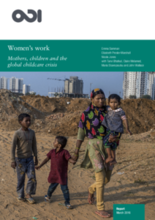The world is facing a hidden crisis in childcare. That crisis is leaving millions of children without the support they need, with damaging consequences for their future. It is also having severe impacts on three generations of women – on mothers, grandmothers and daughters.
There is an urgent need to solve the global care crisis to improve the lives of both women and children and to grow economies. There are 671 million children under five in the world today. Given labour force participation rates that exceed 60% globally, a large number of these children need some sort of non-parental care during the day. Early childhood care and education programming is not managing to match this need. At most, half of three- to five-year-old children in developing countries participate in some form of early childhood education, typically for a few hours daily. We know very little about what is happening to the rest, but all the evidence points to a crisis of care. That crisis is heavily concentrated among the poorest children with the most restricted access to early childhood support.
This report and summary explores the current childcare policy failures across a range of case-study countries, including Viet Nam, Gaza, Mexico, India and Ethiopia, and highlights examples of progress in countries which are successfully responding to these challenges. Based on these findings the authors make six key policy recommendations to extend and improve care-related labour market policies; promote more integrated approaches to social protection; and to invest in better data.

